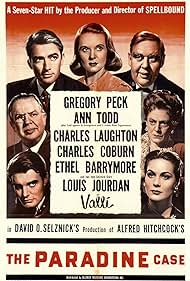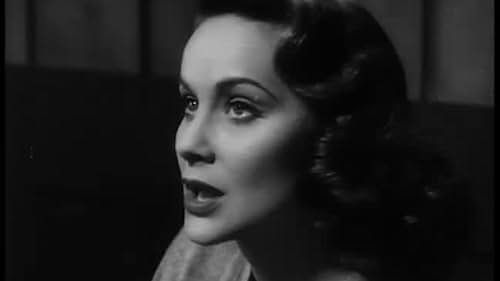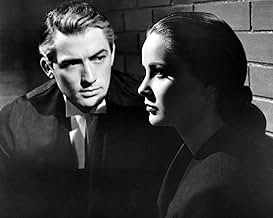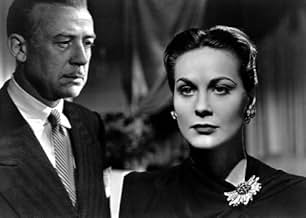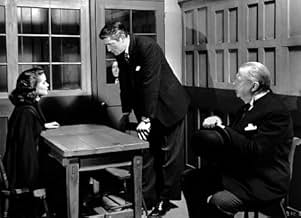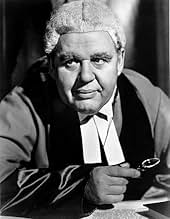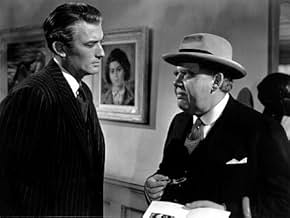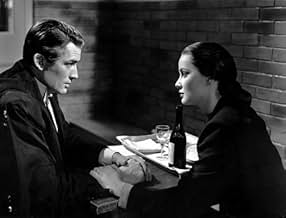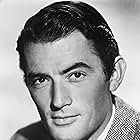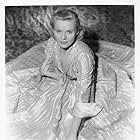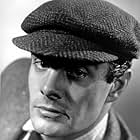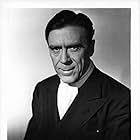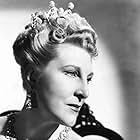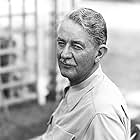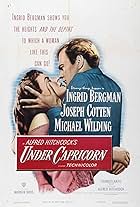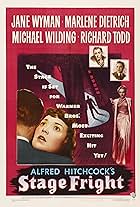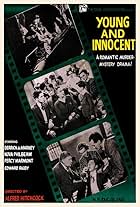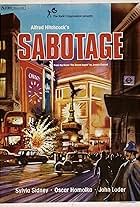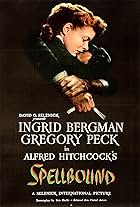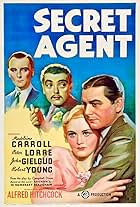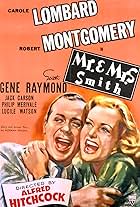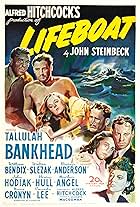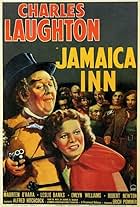A happily married London barrister falls in love with the accused poisoner he is defending.A happily married London barrister falls in love with the accused poisoner he is defending.A happily married London barrister falls in love with the accused poisoner he is defending.
- Nominated for 1 Oscar
- 1 nomination total
Alida Valli
- Maddalena Anna Paradine
- (as Valli)
Patrick Aherne
- Police Sgt. Leggett
- (uncredited)
Gilbert Allen
- Undetermined Role
- (uncredited)
John Barton
- Courtroom Spectator
- (uncredited)
Leonard Carey
- Courtroom Stenographer
- (uncredited)
Steve Carruthers
- Courtroom Spectator
- (uncredited)
Constance Cavendish
- Minor Role
- (uncredited)
Russell Custer
- Barrister in Courtroom
- (uncredited)
Jack Deery
- Juror
- (uncredited)
Storyline
Did you know
- TriviaWhen Sir Alfred Hitchcock delivered the completed movie to the studio, after a Hitchcock record of ninety-two days of filming, it ran almost three hours. This rough cut was initially trimmed to two hours and twelve minutes, which was the version screened for the Academy of Arts & Sciences. In this version, Ethel Barrymore can be seen as the half-crazed wife of Lord Horfield, which explains the Oscar nomination for her performance (there was apparently a brilliant museum scene where Lady Horfield requests Anthony Keane to save Mrs. Paradine, and another scene where Lady Horfield tries to hide her coughing from her husband). Producer David O. Selznick subsequently cut the film to two hours and five minutes, and then to its present length of one hour and fifty-four minutes, in which Barrymore's screen time totals about three minutes. In 1980, a flood reputedly destroyed the original, uncut version, making the restoration of the cut scenes unlikely, although it has been reported that some of these cut scenes reside at the George Eastman House in Rochester, New York.
- GoofsWhen Latour appears outside Keane's inn room, the wind is blowing wildly, whipping Latour's hair across his forehead; yet just a split-second later, after Latour has entered the room, his hair is perfectly combed without a hair out of place.
- Quotes
Judge Lord Thomas Horfield: I do not like to be interrupted in the middle of an insult.
- Crazy creditsIn opening credits scroll below Ethel Barrymore: "and two new / Selznick Stars / Louis Jourdan / and / Valli". Alida Valli's name is in script form, and Jourdan had been playing leading roles in French films for several years before making "The Paradine Case".
- Alternate versionsOriginally released at 132 minutes.
- ConnectionsFeatured in American Masters: Hitchcock, Selznick and the End of Hollywood (1998)
Featured review
With all the proficiency in production for which both Hollywood veterans were recognized, David O. Selznick and Alfred Hitchcock seemed to go halves in creative effort on a polished piece of stagnant entertainment in their ceremonial Paradine Case. Dub it a mystery melodrama, even if that doesn't completely sum it up any more than it did Rebecca, a preceding, much superior production by the two. Classify it as a romantic courtroom would-be tragedy alongside a marriage soap opera. It's all of these things rolled together in one intermittently interesting movie, effortlessly told via Hitchcock's sophisticated camera.
If you recall the lingering distress which Rebecca, the apparition femme fatale of that film, set off all the other characters, albeit she herself was dead, that's the kind of shadowy trouble that the poised Mrs. Paradine affects all the characters in this narrative, except she's quite alive. Nevertheless, her husband, a blind man, is dead and she's on trial for his murder. The story itself has much prospective tension, especially putting Mrs. Paradine at the hub of the drama. It's never cut and dried what she's up to and though the seductive effect of a woman under suspicion on a man with influence is and was nothing new, the plot progresses on its own distinctive path, as she is a distinctive character. The issue is that, unlike Hitchcock's British films, this American Hitchcock film set in Britain dulls the blade of the dramatic elements and turns. Hitchcock's camera has a way of acting like an adept trial lawyer, whirring calmly along with customary material and swiftly punctuating with fluent theatrics, and also unsurprisingly, the movie's furnishings have a lush David O. Selznick guise. However, despite Hitchcock's simplistic mastery of when and how to move the camera, each scene is a dialogue piece that I, to my own surprise, found would be much more impactful in other, perhaps grittier and more contemporary hands.
Slowly, overemotionally, but gracefully enough, this picture files the potentially much more intriguing story of the eponymous widow's swaying lure over many who are impinged on by her trial, in addition to a predetermined eye-opener to the nature of the character herself. It makes a pale wink at the covetousness she provokes in the officiating judge, a typically sharp-tongued Charles Laughton whose urbane hostility has altogether sent his wife over the edge, another powerful narrative element that seems to have been glossed over. There's also disquieting suggestion of Mrs. Paradine's clutch on her husband's valet, a man upon whom keen suspicion is aimed before and during the trial, though mainly it follows the zeal she rouses in the stiff-postured man appointed as her defending counsel and of the torment this causes his wife.
Gregory Peck is fervent as the prominent young London barrister who lets his heart, callously ensnared by his client, control his head, while Ann Todd would be much more persuasively grief-stricken as his wife were it not for Franz Waxman's gushy score being poured on her every word like syrup. Italian import Alida Valli makes the confined Mrs. Paradine a composite of inscrutability, ambiguity and sensuality, and Louis Jourdan is pretty intense as the harassed valet.
It isn't a momentous Hitchcock effort by a long shot, save to the degree that it infers the cave dweller beneath everyone's practiced etiquette and concrete integrity and barristers' wigs. And it isn't a momentous script either, for the intent of cinema that is, developed by Selznick himself from Robert Hichens' novel. After a hazy buildup of evidence and of passion in the lawyer's heart, the story finally goes into a static but enthralling courtroom and thankfully remains there for most of the second hour.
If you recall the lingering distress which Rebecca, the apparition femme fatale of that film, set off all the other characters, albeit she herself was dead, that's the kind of shadowy trouble that the poised Mrs. Paradine affects all the characters in this narrative, except she's quite alive. Nevertheless, her husband, a blind man, is dead and she's on trial for his murder. The story itself has much prospective tension, especially putting Mrs. Paradine at the hub of the drama. It's never cut and dried what she's up to and though the seductive effect of a woman under suspicion on a man with influence is and was nothing new, the plot progresses on its own distinctive path, as she is a distinctive character. The issue is that, unlike Hitchcock's British films, this American Hitchcock film set in Britain dulls the blade of the dramatic elements and turns. Hitchcock's camera has a way of acting like an adept trial lawyer, whirring calmly along with customary material and swiftly punctuating with fluent theatrics, and also unsurprisingly, the movie's furnishings have a lush David O. Selznick guise. However, despite Hitchcock's simplistic mastery of when and how to move the camera, each scene is a dialogue piece that I, to my own surprise, found would be much more impactful in other, perhaps grittier and more contemporary hands.
Slowly, overemotionally, but gracefully enough, this picture files the potentially much more intriguing story of the eponymous widow's swaying lure over many who are impinged on by her trial, in addition to a predetermined eye-opener to the nature of the character herself. It makes a pale wink at the covetousness she provokes in the officiating judge, a typically sharp-tongued Charles Laughton whose urbane hostility has altogether sent his wife over the edge, another powerful narrative element that seems to have been glossed over. There's also disquieting suggestion of Mrs. Paradine's clutch on her husband's valet, a man upon whom keen suspicion is aimed before and during the trial, though mainly it follows the zeal she rouses in the stiff-postured man appointed as her defending counsel and of the torment this causes his wife.
Gregory Peck is fervent as the prominent young London barrister who lets his heart, callously ensnared by his client, control his head, while Ann Todd would be much more persuasively grief-stricken as his wife were it not for Franz Waxman's gushy score being poured on her every word like syrup. Italian import Alida Valli makes the confined Mrs. Paradine a composite of inscrutability, ambiguity and sensuality, and Louis Jourdan is pretty intense as the harassed valet.
It isn't a momentous Hitchcock effort by a long shot, save to the degree that it infers the cave dweller beneath everyone's practiced etiquette and concrete integrity and barristers' wigs. And it isn't a momentous script either, for the intent of cinema that is, developed by Selznick himself from Robert Hichens' novel. After a hazy buildup of evidence and of passion in the lawyer's heart, the story finally goes into a static but enthralling courtroom and thankfully remains there for most of the second hour.
Details
- Release date
- Country of origin
- Official sites
- Language
- Also known as
- Alfred Hitchcock's The Paradine Case
- Filming locations
- Lake District, Cumbria, England, UK(on location)
- Production companies
- See more company credits at IMDbPro
Box office
- Budget
- $4,258,000 (estimated)
- Gross worldwide
- $6,789
- Runtime2 hours 5 minutes
- Color
- Aspect ratio
- 1.37 : 1
Contribute to this page
Suggest an edit or add missing content

